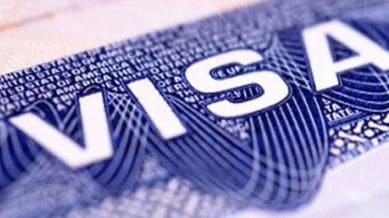US may deny visas to applicants with diabetes, obesity under new Trump administration rule: report
About one in ten people globally live with diabetes, and cardiovascular diseases remain the leading cause of death worldwide.

US visas applications could now be denied if they have certain medical conditions such as diabetes, heart disease, or obesity, under a new Donald Trump administration directive that expands the government’s ability to reject applicants on health grounds.
The guidance, issued Thursday in a cable from the State Department to consular officials and obtained by KFF Health News, instructs visa officers to consider a wide range of chronic or costly medical conditions — including cardiovascular, respiratory, neurological, and mental health disorders — as potential grounds for ineligibility.
monthly limit of free stories.
with an Express account.
The rationale, according to the document, is to prevent immigrants who might become a “public charge,” or financial burden on the US government, from entering the country. Officers are told to evaluate whether applicants have sufficient financial means to cover medical costs “over their entire expected lifespan” without seeking public assistance.
The new rules mark a major departure from longstanding practice. While health screenings have long been part of visa applications — checking for communicable diseases like tuberculosis and ensuring vaccination compliance — the expanded criteria go far beyond infectious conditions. Experts as per CBS say the move grants far more discretion to visa officers, who are not medically trained, to make subjective judgments about an applicant’s long-term health prospects and economic stability.
Charles Wheeler, senior attorney at the Catholic Legal Immigration Network, told CBS, that the policy “encourages consular officers to speculate about potential medical costs based on bias or limited knowledge.” He noted the language contradicts the State Department’s own Foreign Affairs Manual, which prohibits denying visas on speculative “what if” scenarios.
The cable also extends scrutiny to applicants’ dependents, urging officials to consider whether family members’ disabilities or chronic illnesses could affect the applicant’s ability to work and remain self-sufficient.
Immigration lawyers and public health experts have criticised the guidance as part of the Trump administration’s broader crackdown on immigration, which has included mass deportations, refugee restrictions, and efforts to reshape the visa system to favour wealthier and healthier applicants.
Sophia Genovese, an immigration lawyer at Georgetown University, told CBS that the the guidance “goes well beyond the traditional medical exam” and effectively allows visa officers to deny applications based on “speculative medical costs or conditions that are extremely common worldwide.”
About one in ten people globally live with diabetes, and cardiovascular diseases remain the leading cause of death worldwide. Genovese further told CBS that such criteria could exclude millions of potential applicants: “If the US begins treating chronic illness as disqualifying, it raises serious ethical and humanitarian questions about who deserves entry.”